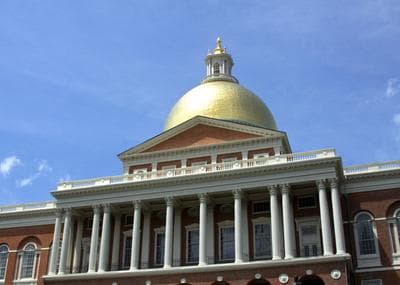Advertisement
Mass. Lawmakers Face Budget, Drug Lab Questions

But there will be little time to celebrate past accomplishments when the Legislature reconvenes Wednesday for the start of the next two-year session. The recent months brought a spate of disappointing and even disturbing news, some of which may require the immediate attention of legislators.
A drug testing scandal in a now-closed state lab threatened to unravel thousands of criminal cases; a deadly nationwide fungal meningitis outbreak was linked to a steroid produced by a specialty pharmacy regulated by the state; and revenue projections used to craft the current state budget were revealed as overly optimistic, prompting Gov. Deval Patrick to call for $540 million in spending adjustments.
Add to that a key unresolved issue from the last session, the state's broken transportation finance system, and there is every expectation for a lively start to the session.
Money matters will undoubtedly be at the top of the agenda.
Patrick wants prompt action on a series of measures to help patch the budget hole, including a $200 million transfer from the state's reserve, known as the rainy day fund, and $25 million in cuts in the judicial and legislative branches.
One of the smaller cuts proposed by Patrick, $9 million in unrestricted local aid, may be the one that meets the most resistance. Cities and towns say the 1 percent reduction could wreak havoc with municipal budgets and many lawmakers in both parties have been publicly sympathetic to those complaints.
The governor, meanwhile, has repeatedly sought what he calls an "adult conversation" in the next session about paying for transportation. The meaning of the phrase is unmistakable - Patrick believes the Legislature must be willing to consider new revenues to stave off another round of hikes in public transit fares and free up money to fix crumbling roads and bridges.
Patrick has not yet specified how he would seek to pay for such repairs, but Michael Widmer, president of the nonpartisan Massachusetts Taxpayers Foundation, believes there is little other choice but to raise the state's gasoline tax of 21 cents per gallon.
"There really is no alternative to the gas tax in the short term when you are talking about several hundred million dollars of additional transportation revenues," said Widmer.
The gas tax hasn't changed in more than two decades and an attempt by Patrick to raise it during his first term went nowhere in the Legislature. It's unclear whether sentiments have changed since.
Another item near the top of the Legislature's to-do list is the governors' request for $30 million to address the drug lab crisis, blamed on a rogue chemist who allegedly manipulated drug samples over nine years at the now-shuttered Department of Public Health lab. The administration has proposed diverting money from the rainy day fund to cover initial costs incurred by courts, district attorneys, public defenders and other agencies dealing with fallout from the scandal as thousands of criminal cases are reviewed.
Officials acknowledge that $30 million might only be a starting point when it comes to costs, and a larger question facing lawmakers may be how to prevent similar crises. Legislative hearings in recent weeks examined lapses in oversight by public health managers that critics believe contributed to the drug lab crisis.
Similar questions await lawmakers in response to the fungal meningitis outbreak in the U.S. that has claimed nearly 40 lives. Framingham-based New England Compounding Center, the firm that distributed the steroid blamed in the deaths, was regulated by the state Board of Pharmacy, which also falls under the public health department. Documents show the company had avoided punitive action from the board despite concerns raised about sterility and other matters.
The governor was expected to file legislation in the coming weeks calling for changes in the makeup of the pharmacy board and tighter regulation of compounding pharmacies.
But with all of the pressing issues before lawmakers, there are likely to be distractions as well.
Political distractions could include a special election to replace U.S. Sen. John Kerry if the Massachusetts Democrat is confirmed as secretary of state, and early jockeying in the 2014 race for governor.
The cloud caused by a federal investigation into patronage hiring at the state probation department also continues to hang over Beacon Hill. No lawmakers have been charged in the more than two-year probe, but prosecutors continue to look the hiring of politically connected people over more qualified candidates for jobs in the department.
And economists note an already sluggish Massachusetts economy could suffer greatly if Washington fails to avoid the combination of tax increases and spending cuts known as the fiscal cliff. Such a development would pose even more challenges for the Legislature as it assembles a spending plan.
"The budget for 2014 is going to be very difficult," Widmer said.
This program aired on December 29, 2012. The audio for this program is not available.